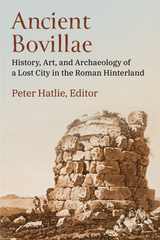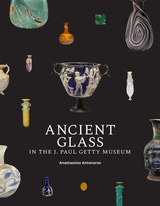
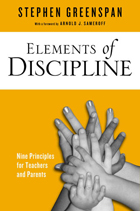
Elements of Discipline is a timely and helpful book for teachers, parents, and day-care professionals that provides a simple set of rules for managing—successfully and humanely—a wide range of discipline situations and challenges. A well-respected child development specialist, Stephen Greenspan outlines his “ABC Theory of Discipline.” He combines an Affective approach, a Behavioral approach, and a Cognitive approach that, when used in a coordinated fashion, will contribute to greater child compliance and family/classroom harmony.
Greenspan suggests that, using his matrix, caregivers can provide the warmth, tolerance, and influence that will help children become competent in three socio-emotional domains—happiness, boldness, and niceness. He recommends caregivers pick and choose from the discipline literature in a manner that best suits their individual style and values.
Elements of Discipline is a lively guide to effective classroom or family management.
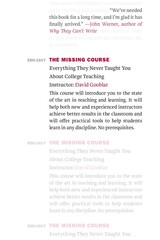
“What a delight to read David Gooblar’s book on teaching and learning. He wraps important insights into a story of discovery and adventure.”
—Ken Bain, author of What the Best College Teachers Do
College is changing, but the way we train academics is not. Most professors are taught to be researchers first and teachers a distant second, even as scholars are increasingly expected to excel in the classroom. There has been a revolution in teaching and learning over the past generation, and we now have a whole new understanding of how the brain works and how students learn. The Missing Course offers a field guide to the state-of-the-art in teaching and learning and is packed with insights to help students learn in any discipline.
Wary of the folk wisdom of the faculty lounge, David Gooblar builds his lessons on the newest findings and years of experience. From active-learning strategies to ways of designing courses to get students talking, The Missing Course walks you through the fundamentals of the student-centered classroom, one in which the measure of success is not how well you lecture but how much your students actually learn.
“Warm and empirically based, comprehensive but accessible, student-centered and also scientific. We’re so lucky to have Gooblar as a guide.”
—Sarah Rose Cavanagh, author of The Spark of Learning
“Goes beyond critique, offering a series of activities, approaches, and strategies that instructors can implement. His wise and necessary book is a long defense of the idea that a university can be a site of the transformation of self and society.”
—Los Angeles Review of Books
“An invaluable source of insight and wisdom on what it means to work with students. We’ve needed this book for a long time.”
—John Warner, author of Why They Can’t Write
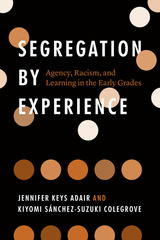
In Segregation by Experience, the authors filmed and studied a a first-grade classroom led by a Black immigrant teacher who encouraged her diverse group of students to exercise their agency. When the researchers showed the film to other schools, everyone struggled. Educators admired the teacher but didn’t think her practices would work with their own Black and brown students. Parents of color—many of them immigrants—liked many of the practices, but worried that they would compromise their children. And the young children who viewed the film thought that the kids in the film were terrible, loud, and badly behaved; they told the authors that learning was supposed to be quiet, still, and obedient. In Segregation by Experience Jennifer Keys Adair and Kiyomi Sánchez-Suzuki Colegrove show us just how much our expectations of children of color affect what and how they learn at school, and they ask us to consider which children get to have sophisticated, dynamic learning experiences at school and which children are denied such experiences because of our continued racist assumptions about them.
READERS
Browse our collection.
PUBLISHERS
See BiblioVault's publisher services.
STUDENT SERVICES
Files for college accessibility offices.
UChicago Accessibility Resources
home | accessibility | search | about | contact us
BiblioVault ® 2001 - 2025
The University of Chicago Press




